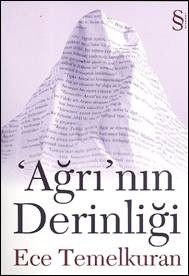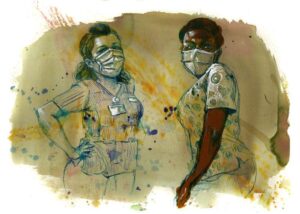‘The Deep Mountain’

Ece Temelkuran takes a journey into the Armenian mentality and tries to understand the heart of ‘Armenians’
Ece Temelkuran is the most-read female political columnist in Turkey, writing regularly for Milliyet. Her latest book, The Deep Mountain, published in Istanbul in May 2008, is currently being translated into English. Based on interviews with Armenians in Armenia, France and the U.S.
I had a chance to have an interview her about her latest book for Turkish Journal…
How did you get involved in researching the Armenian issues?
It was because of Armenian Turkish journalist Hrant Dink. A dear friend. Before he was shot to death by an ultra-nationalist teenager on 19th of January in 2007, he was the most influential advocate of the dialogue between the Turkish and the Armenian communities. Before hearing him, the Armenian issue was just another cold, obnoxious subject to me as it is and has been to any ordinary Turkish person. But after meeting Hrant and listening probably one of the most touching personal stories concerning the Armenian issue the whole picture changed for me. It is not only me I suppose, it was like this for most people in Turkey. Because of Hrant, the Armenian issue became a personal thing, an emotional matter for most of us.
How did you have contact with people in Los Angeles?
Actually Hrant was supposed to put me in contact with Armenian community in L.A. But unfortunately he was killed then. So I was kind of alone. People I have met in Paris and in Armenia helped me a lot. As you might imagine the Armenian community is quite a closed one. There are pros and cons of this nature of the community. It is hard to get in but once you get in that means that you have full access. It is a matter of trust like other relations.
What did you learn from them through the Armenian issues?
My personal experience was that this issue was and must be a personal issue for all Turkish people. Not that we should automatically feel guilty or ashamed but we must feel something. The official discourse about the Armenian issue has been forcing us not to feel anything about this issue. Being a Turk means that you either feel nothing about the Armenians or the word ‘Armenian’ must push the button of hatred in you. In ‘The Deep Mountain’ I tried to investigate this mood of ours. In that sense this book is about being a Turk rather than the Armenians. As a Turk, I tried to search my own feelings about the issue. The book is both a journey through the Armenian diaspora and into the depth of being a ‘Turk’ which I think is a word that must be redefined immediately.
Did you see any difference between the American Armenians and French or Armenian ones when they talk about that issue?
It is natural that there are differences among the diaspora communities depending on where and how they live. But saying this I must add that is impossible to agree with the official propaganda of Turkey saying that ‘the American Armenians are all hardliners and the Armenians living in Armenia are ready to compromise on 1915’. Such generalizations are making the matter even more difficult. I guess underneath every hardliner Armenian lives a person who has been hurt deeply. These people are and have been homeless through generations. Even it is hard to emphasize with them about the things happened in 1915, I guess it is possible for those Turkish people living abroad to understand their feeling of homelessness. The Turkish people in the US must the ones who can understand the Armenians best. Because both of them know the painful taste of homelessness. And both communities know that the word ‘home’ tastes different when you say it in Turkish and that they both are from Anatolia.
What is your most memorable interview in that time?
It was Silva Gabudikyan from Yerevan. She was the oldest female poet of Armenia and she told me the sentence which became an inspiration for the name of the book: “Ararat is a question of height for you. But it is a matter of depth for us.” That is why the name of the book became ‘Ağrı’nın Derinliği in Turkish and ‘The Deep Mountain’ in English.
What did you see after you questions nationalism on all sides?
It is a must for both communities to redefine themselves concerning the Armenian-Turkish issue. The Turkish side established its attitude on silence and the Armenian side identifies itself with pain and loss. It has been like this for a century. Every side must be able to look itself from outside the nationalist discourse. My book is an attempt coming from the Turkish side. I wish someone from the Armenian side takes a similar journey into the Turkish mentality and tries to understand the heart of ‘the Turk’ as I did for the Armenians.
How did people react after reading this book?
Turkish people, as I wished while writing, took a journey to their past and tried to remember when and how they were taught to hate the Armenians. They dug out those little details from their memories which made them operate like jukeboxes. Say a word concerning Armenians and the Turk starts to shout. We are not like this, we are more than this. I guess the Turkish readers started to see their own depth in that sense. As for the Armenian readers, they were moved. I remember one middle-age women trying to kiss my hand for writing such a book. It was embarrassing but I am giving this example to express the depth of need for a positive step coming from Turkish side.
Could we tell this book is an open letter to each side?
It is an open letter. But this letter is not only for the Armenians and the Turks, but for those who know the weight of the word ‘home’.
Could you talk a little bit about what is the mood right now in both sides? I am interested in this from your perspective.
There are new attempts for diplomatic relations between Armenia and Turkey which are inspiring. On the other side my personal perspective is that the relations must be established between people as much as they are between the states. Otherwise the diplomatic relations can be too fragile to be consistent.
Public feel tired of hearing racist and dishonest histories. Do you think “The Deep Mountain” is given a fair chance to hear all sides?
It is not only a fair but it is deeper than the usual way of telling the story. I guess we both suffer of the existing superficial way of talking about the issue. It is not true that we don’t know or remember anything concerning the Armenians. And as for the Armenians, it is not true that revenge is the only feeling that they have towards Turkish people. Anger and the official discourses reduce us to people that we are now. We both are more than this. End the book tells about the ‘more’.
Ece Temelkuran is senior political columnist for Turkey’s leading quality daily, Milliyet, and regular contributor to Le Monde Diplomatique, writes about Kurdish issues, political Islam, political prisoners, and Armenian issue. She studied at the University of Ankara in the Faculty of Law, and started her career as a reporter on Cumhuriyet. She has published widely and won numerous awards for her work, including the Pen for Peace Award, and Turkish Journalist of the Year. She is the author of 9 books, including, “What Is There For Me To Say!” on the hunger strikes by political prisoners in Turkey, and “We are Making A Revolution Here Senorita!” on the politics and every-day life in Chavez’s Venezuela. In spring 2008, she was awarded the Freedom of Thought prize by the Human Rights Association of Istanbul for her courageous articles and essays.
(Turkish Journal)



